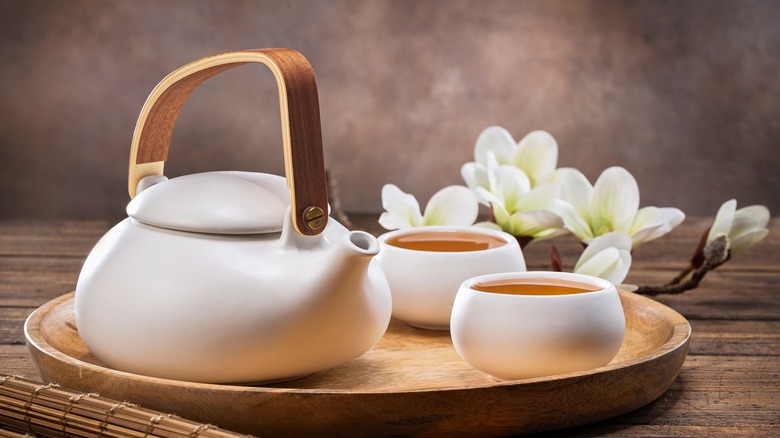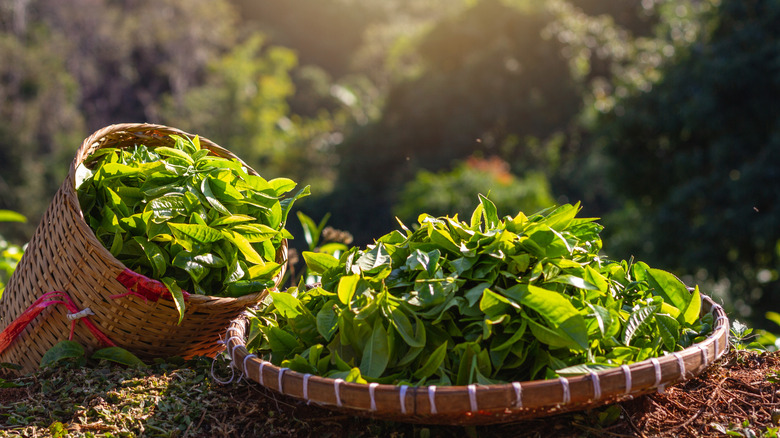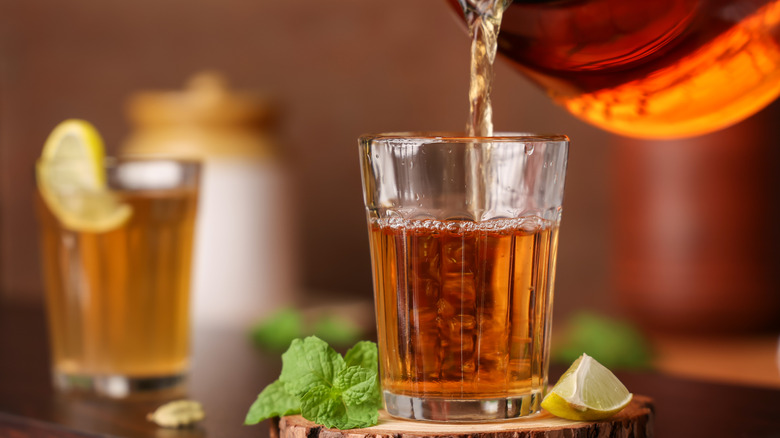The Legend Of Tea's Origin And The Accident That Changed The World
Tea is believed to be the most widely consumed drink in the world, coming next to only water. Brewing methods may differ from region to region, but just about every country has a tea preparation that it calls its own. A few sprigs of mint leaves go into Morocco's touareg tea, Indians prefer their tea with milk and spices, tea ceremonies are an important aspect of Zen Buddhism in Japan, and Britain's afternoon teas are an institution in themselves. Just how did tea come to enjoy such global popularity? Well, that's a fascinating story.
The history of tea is riddled with myths, legends, and a whole lot of confusion, at the center of which is one key nation. Archeological evidence has found that China was drinking tea long before anyone else. Remains of tea excavated from the 2,100-year-old tomb of China's Jing Emperor Liu Qi at the Han Yangling Mausoleum are believed by experts to be the oldest evidence of tea found to date (via NPR).
The discovery of tea traces in Chinese tombs has only fueled the validity of an ancient legend that has long credited China with the origin of tea. The legend claims that Chinese Emperor Shen Nung's servant was brewing him a glass of boiling water when an unsuspecting leaf accidentally fell into it — a leaf that was none other than what the world now calls tea.
An emperor's accidental beverage gave the world its first tea
The legend states that the discovery of tea dates back to 2737 B.C. when mythical Chinese emperor Shen Nung (also spelled Shennong), who was also an acclaimed farmer and herbalist, was sitting under a tree. The emperor's servant was boiling water nearby when leaves from the tree just so happened to fall into the pot. Unbeknownst to the servant or the emperor, the leaf was Camellia sinensis — a tea leaf. The emperor gave the accidental drink a try, and so the story of tea began.
Emperor Shen Nung called the drink ch'a and found the tea leaves to have significant medicinal properties. As a result, the tea at the time was boiled into a bitter beverage that was drunk mainly for its healing abilities. It's believed that Emperor Shen Nung himself drank tea as a detoxifying tonic to rid his body of poisons from consuming wild plants during his medicinal research.
While the high-quality tea leaves found in the tomb of Jing Emperor Liu Qi of the Han dynasty, who died in 141 B.C. indicate that the Chinese nobility may have drinking tea as a medicine for years, the beverage only gained nationwide popularity later. Tea rose as a drink of pleasure under the reign of the Tang dynasty, taxes were imposed, and Chinese merchants began to roast and oxidize green tea leaves to make a new variant — black tea — that could withstand long travels as tea began to be exported out of China.
Tea travels to the rest of the world
Once China had enjoyed tea for several centuries, it began to be exported to different parts of the world. Tea took off in Russia after it was given as a gift to Tsar Alexis in 1618, Buddhist monks took tea to Japan, and the Portuguese in China brought tea back to Portugal with them for personal consumption. The Dutch transported the first commercial batch of black tea leaves in 1606 from China to Holland and introduced the drink to the rest of Europe.
By 1658, the first mention of tea was advertised in the British newspaper Mercurius Politicus, and tea began to appear at coffee houses in London, though it remained an unfamiliar drink to most. A turning point for tea's popularity was the marriage of Charles II to the Portuguese princess Catherine of Braganza, who had a fondness for tea and made it a vogue drink across the UK.
As tea's popularity soared in England and its American colonies, the East India Company's (the main importer of tea) trade monopoly with China diminished, and it looked towards India to meet the increasing demand. By 1888, Britain's tea imports from India had far surpassed any tea trades made with China in the past, turning Britain and its American colonies into tea-drinking nations for the rest of time. What began as an accidental discovery some 5,000 years ago is now enjoyed in all corners of the world, all thanks to an emperor, a pot of boiling water, and a rogue leaf.



